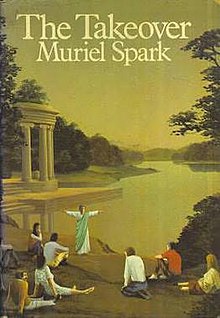Muriel Spark spent much of her life living in Italy with her companion Penelope Jardin; but even still her fiction tended to focus on the Scotland and the England of her relative youth. The Takeover gives an image of what Spark might have been attracted to in Italy: one of its two protagonists, Hubert Mallindaine, lives on the secluded shores of Lake Nemi where he believes his ancestress, the goddess Diana, once roamed, and which is still redolent with the kind of nature she prized. Hubert is in the midst of being thrown out by his old friend and landlady, Maggie Radcliffe, who wants to take possession of the house she has lent him; but Italian law makes this obscenely difficult.
Like most of Spark's books, that summary really doesn't get to the strange and complex things happening inside The Takeover. It's a little longer than most of her novels, and Spark uses the extra space to people The Takeover with a rich caste of characters: the patriotic young noblewoman Letizia, the pansexual, perpetually aggrieved servant Lauro, Hubert's loyal but stupid secretary Pauline, even a couple of Jesuit priests who are strangely delighted when Hubert starts his own cult of Diana-worship at Nemi. That's a Spark book for you: people never do what you expect them to; in fact, they do the opposite. Just like the obscure lawyer who Maggie enlists to help her oust Hubert, only for him to abscond immediately to Hubert and offer him his two-timing services. The effect is a book which can only be appropriately described as madcap.
The house which Maggie owns and Hubert inhabits turns out to have been built on the land of the servant Lauro's fiancee. It is, according to Italian law, abusivo, illegal--it doesn't exist. In the eyes of the law, it's pure fiction, and it doesn't really belong to anyone. I think part of Spark's intention in The Takeover is to show just how deeply we are invested in things we feel are material, but really are not. Maggie gives her fortune to be entrusted to a shady jetsetter with the excellent name of Coco de Renault; it disappears, spread among the balance sheets of hundreds of shady banks. The connection Hubert feels to his home, and to Nemi, are pure imagination. The wealthy set who make up the caste of The Takeover, Spark asks--what do they really own? What do they look like when they are, in the words of King Lear, nothing but "unaccommodated man?"
It also has the benefit of being one of Spark's funniest books. A late scene where Pauline interrupts one of Hubert's cult meetings, trying to ruin it by injecting a Bible verse, only for the whole thing to turn into a riot and an orgy, is especially satisfying. And in her cynical, mordant way it can be quite insightful, as when she talks about Hubert's belief in his prayer to Diana:
...so ardently had he been preaching the efficacy of prayer that he now, without thinking, silently invoked the name of Diana for every desire that passed through his head, wildly believing that her will not only existed but would certainly come to pass. Thus, like ministers of any other religion, he was estranged from reality in proportion as he mistook the nature of prayer, offering up words of praise, of gratitude, penitence, intercession and urgent petition in the satisfaction that his god would reply in kind, hear, smile, and wave a wand. So that, merely because he had known in the past that the unforeseen stroke of luck can happen, and that events which are nothing short of a miracle can take place, Hubert had come secretly to take it with a superstitious literalness that the miraculous may happen in front of your eyes; speak the word, Diana, and my wish will be fulfilled. Whereas, in reality, no farmer prays for rain unless the rain is long overdue; and if a miracle of good fortune occurs it is always at the moment of grace unthought-of and when everybody is looking the other way.
For a woman whose conversion to Catholicism is such a notable part of her biography, Spark always seems to look at religion with a jaundiced and pragmatic eye.
I enjoyed The Takeover quite a bit. I always worry that getting deep into an author's oeuvre will bear diminishing returns, that after you read the notable stuff you're just going to end up disabusing yourself of your admiration. But The Takeover gave me hope that there's still some hidden gems in Spark's back-catalogue.


2 comments:
The Prime of Miss Jean Brodie >
The Mandelbaum Gate >
The Only Problem >
A Far Cry from Kensington >
Girls of Slender Means >
The Takeover >
Loitering with Intent >
Momento Mori >
Robinson >
The Ballad of Peckham Rye >
Hothouse on the East River >
The Driver's Seat >
Symposium >
Territorial Rights >
Aiding and Abetting >
The Finishing School
SO MANY MURIELS TO READ
Post a Comment